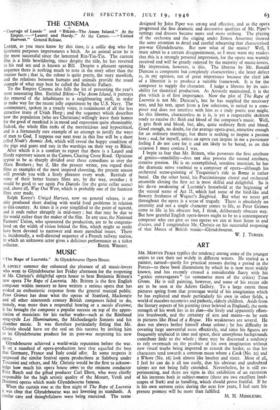MUSIC " The Rape of Lucretia." At Glyndebourne Opera House.
A LOVELY summer day enhanced the pleasure of all music-lovers who went to Glyndeboume last Friday afternoon for the reopening of Mr. Christie's delightful opera house to hear Benjamin Britten's new opera The Rape of Lucretia. Mr. Britten is the first English composer within memory to have written a serious opera that has evoked an enthusiastic response from the general musical public. Peter Grimes has done what the operas of Stanford, Mackenzie and all other nineteenth century British composers failed to do, namely, won more than a respectful hearing or a succes d'estime, it has brought the composer a popular success on top of the appre- ciation of musicians for his earlier works—such as the Rimbaud song-cycle Les Illuminations, the Michaelangelo Sonnets and his chamber music. It was therefore particularly fitting that Mr. Christie should have set the seal on this success by inviting him to let Glyndebourne produce for its post-war reopening his new opera.
Glyndebourne achieved a world-wide reputation before the war. It set a standard of opera-production here that equalled the best that Germany, France and Italy could offer. In some respects it surpassed the similar festival opera productions at Salzburg under Toscanini and others, and Mr. Christie would be the first to acknow- ledge how much his opera house ofiei to the eminent conductor Fritz Busch and the gifted producer Carl Ebert, who were chiefly responsible for the high artistic quality of the Mozart, Verdi and Donizetti operas which made Glyndebourne famous. When the curtain rose at the first night of The Rape of Lucretia it was clear that Glyndebourne was not lowering its standards. A similar care and thoughtfulness were being exercised. The scene
designed by John Piper was strong and effective, and as the opera progressed the fine dramatic and decorative qualities of Mr. Piper's settings and dresses became more and more striking. The playing of the orchestra and the singing under Ernest Ansermet showed the same attention to detail and careful rehearsing that characterised pre-war Glyndebourne. But now what of the music? Well, I must admit to a certain disappointment, so I must warn my readers that this is a strongly personal impression, for the opera was warmly received and will be greatly enjoyed by the majority of music-lovers. My impression, however, is this. The libretto by Mr. Ronald Duncan is competent but completely characterless ; the latter defect is, in my opinion, not of great importance because the chief job of a librettist is to produce a suitable framework. It is for the composer to supply the character. I judge a libretto by its suit- ability for theatrical production. As Aristotle maintained, it is the plot which is of first importance. Now the plot of The Rape of Lucretia is not Mr. Duncan's, but he has supplied the necessary text, and his text, apart from a few solecisms, is suited to a com- poser and does not interfere with him as a truly poetic text might. So this libretto, characterless as it is, is yet a respectable skeleton ready to receive the flesh and blood of the composer's music. Well, it gets flesh and blood, but, alas, quite ordinary flesh and blood. Good enough, no doubt, for the average opera-goer, attractive enough for an ordinary marriage, but there is nothing to inspire a passion here • and, for myself, unless an opera can inspire in me a passionate feeling I do not care for it and am likely to be bored, as on this occasion I must confess I was.
I begin to fear that Mr. Britten, who possesses the first attribute of genius—sensibility--does not also possess the second attribute, creative passion. He is an accomplished, sensitive musician, he has the dramatic sense essehtial to a composer of opera—although his orchestral scene-painting of Tarquinius's ride to Rome is rather banal. On the other hand, his Puccinniesque choral and orchestral ensemble closing the first act is most skilful and delightful. So is his dawn awakening of Lucretia's household at the beginning of the second scene of Act II, which had some of the bird-like and flowery freshness of Wagner's Siegfried. But what we never get throughout the opera is a sense of tragedy. There is absolutely no intensity and not a single character comes to life, as Peter Grimes came to life in his obscure but, I think, deliberately obscure way. But how grateful English opera-lovers ought to be to a contemporary composer who can give us two operas we can at least listen to and discuss, and I congratulate Mr. Christie on his successful reopening of that Mecca of British music—Glyndebourne.
W. J. TURNER.


























 Previous page
Previous page